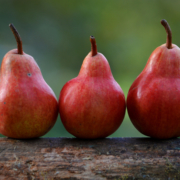Keep Swapping!
 Which of the food swaps that I recommended in the last newsletter have you put into practice? Just one would be a good start. I’d like to hear how it is going for you.
Which of the food swaps that I recommended in the last newsletter have you put into practice? Just one would be a good start. I’d like to hear how it is going for you.
Swapping to gluten-free foods, stepping away from dairy, and trading your salt shaker contents will reduce your levels of inflammation, remove the influence of bovine growth hormones, and balance your body’s mineral and water balance. What else can you swap to benefit your level of wellness?
Fats and Oils
Let me start with some really good news: eating fat does not make you fat! What a relief, eh? Think about it. How long has the low-fat diet been promoted? And how’s that working for us? Not so well.
I can think of two reasons for this: 1) when the food industry removes fat, they replace it with processed carbohydrates to cover the loss of flavor, and 2) the body needs good fats as building blocks for cells and the brain. When eating low-fat products, you are eating more empty calories, and your body is robbed of resources to maintain the health of your cells.
So besides avoiding low-fat food products, what swaps can you make to improve your supply of fat for your cells?
For a solid fat, I recommend unrefined coconut oil, butter or ghee. You will want to look for butter that is rBGH free (no growth hormones) to avoid the added hormones that often come with dairy products. Ghee is clarified butter, which can be used by many who are lactose intolerant. And please avoid any food that has “partially hydrogenated” anything – that’s a key source of coronary disease.
When you need a liquid fat source, I suggest that you switch from industrial oils – canola, corn, cottonseed, safflower, and sunflower oils – to Extra Virgin Olive Oil packaged in a dark bottle. Olive oil can break down in light, so the many varieties that you see on the store shelves in clear bottles, or worse, clear plastic, are likely to have degraded nutrients.
And what about other food sources for healthful oils? Avocado and raw nuts top my list. Many diet programs encourage you to avoid these because they come with higher calorie count; however, I view them as valuable in moderation because of their healthful fat and nutrients.
Sugar
You knew I had to bring this one up. If you aren’t willing to give up sugar altogether, perhaps you would consider swapping to a less damaging source of sweetness.
Look for local raw honey to sweeten your drinks and foods. Honey provides minerals and steady exposure to local pollen, which can help your body build resistance to allergens. Pure maple syrup, especially the darker Grade B, has minerals and antioxidants. And lastly, have you tried coconut palm sugar? It’s appearing in more grocery stores and offers a lower glycemic source of sweetness. And of course, if you are looking for a low-calorie sweetener, I recommend stevia – but be sure to look for a brand that has minimal ingredients.
Change your sweetening sources, but also reduce the amount of sweeteners you use. You can shift your taste buds to be satisfied will less sugar. Dilute your sweet tea with unsweetened. Reduce the sugars that you use in your baking. What other ways can you reduce your consumption of sugar … without using those pink, yellow or blue packets?
So I’ve shared a total of five relatively simply food swaps you can make that will bring dividends and the wealth of improved health. Which one – or ones – will you incorporate in your daily life? Reply to me with your choice, or with your questions, or post on the Pursue Wellness Facebook page. I’m eager to hear from you.
Have a blessed 2015!



